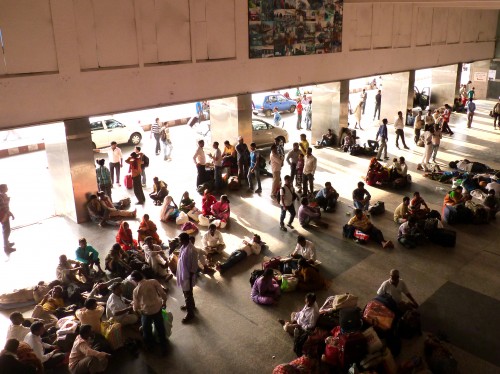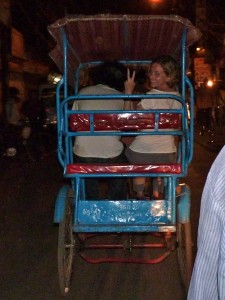As we entered the New Delhi Railway Station for the first time, we were prepared for a veritable gauntlet. We were well-documented on how to buy train tickets, avoid touts and stay focused on the objective. And yet, and yet…we got mildly fleeced. When the diversion was over and done with, we were left awestruck at the precision of the whole operation. Here’s how it happened:
- Indians are helpful and friendly, but not too much. As we walked into the train station, unsure of which way to go, a random man told us that the International Tourist Bureau was to the left. He was neither too friendly nor too eager, so we went duly left.
- An authority figure further softened our defenses. A security guard stopped us and asked to see our tickets. We explained that we wanted to buy tickets and he said that we should go to the tourist office in Connaught Place. One of our mistakes was here. The fake security guard did not ask any of the passing Indians to show their tickets – only us.
- Time is running out. It was 3:20 when we got to the train station and the security guard said the office was only open until 4 pm.
- The fake security guard created confidence that he was “on our side” by personally escorting us out of the train station and putting us in a rick shaw with an admonishment to never pay more than 20 rupees for a short journey like the one we were about to take to Connaught Place.
- Upon arriving to the “tourist office,” the salesman first gathered information about us and our trip. An American and a Spaniard, spending 2-3 months in India.
- The salesman assuaged our doubts about the office by saying that the main, larger office was currently under construction.
- He next closed off our preferred travel option of the train by pretending to consult availability and saying that there were no trains for another 5 or 6 days. He sought plausibility by explaining that there was a holiday (Mewar – this was true but it is not a holiday that makes the trains sell out). Here is where being informed came in handy. We had checked the IRCTC website just before leaving for the railway station and there were over 200 seats available on the train we wanted to book, so our growing suspicion about where we had been taken was confirmed.
- The salesman positioned himself as the way to salvage our trip by offering to arrange a car with a driver for a 4-5 day tour of Rajasthan, for a whopping USD$400. (For this amount, we could take 20 trains in one of the nicer classes.)
- He aimed to put us in a state of doubt. He gave very authoritative advice about what our itinerary should be. He even pulled out a register to show us that a couple of Americans had booked a car tour just the day before, explaining that they had been to India four times and even though they were much more experienced in India than us, they had given up on taking the train.
- He tried to put us in a state of fear. Delhi was very dangerous, he said, and 80 percent of tourists had cancelled their trips after the rape incidents that were reported in the media at the end of 2012. We would go crazy if we spent 5 days in Delhi, he said.
- Time is running out, again. When we tried to politely end the interaction by saying that we had plenty of time to figure out our plan and would maybe come back tomorrow, the salesman said that they would be closed for the following four days for the holiday. Our only chance was to book that very afternoon.
- His last, go-for-the-jugular move was to try to make us feel bad for not buying anything from him. “I can see in your face that you don’t trust me,” he said, looking at Casey specifically. “I know that if you push an American, they will not buy anything from you.”
At this point, the conversation had run its course. We were obviously not going to book a car, so we thanked him for his time and left the office.
From what we have read of other tout scams at the New Delhi Railway Station, we were lucky that our field trip only cost us 20 rupees and that we were able to leave unscathed. We felt a strange mix of confusion and exhilaration. We consider ourselves fairly experienced travelers – how did that just happen to us? But mostly we thought, man, these people are professionals. If we had wound up taking a car, these folks had truly earned their commission.
When the fake security guard put us in the rickshaw, he smiled broadly, shook our hands and said, “Welcome to India.” Indeed.
If you’re headed to New Delhi Railway Station, don’t go when the International Tourist Bureau is closed. If you’re looking to “do it yourself” with Indian trains, read the India page on www.seat61.com in full detail, maybe twice, and follow the instructions to the letter.




2 comments
Good story. Yeah, unfortunately you are going to find plenty of those everywhere you go, specially if you go to Thailand. I am glad you could escape unharmed from the scam.
Good piece of info here.
Incredible India